Man Asks GF Who Just Moved In To Rehome Her Cats After Discovering His Daughter Is Allergic, GF Refuses
Your immune system searches for and eliminates foreign objects every day (or ejects them through a sneeze). Immune systems vary in sensitivity among individuals.
Essentially, the tiny proteins secreted by your cat in her saliva, dander (dead skin cells), and urine trigger allergic reactions in people with cat allergies. Pet hair alone is not an allergen, despite what many people believe.
Yet, when your cat sheds, hair can gather pet dander and cause it to be dispersed randomly around your home. It can accumulate on carpets, furniture, and bedding, and even hang suspended in the air for a very long period of time.
Some people are fortunate enough to lose their sensitivity to cat allergies eventually. While this is undoubtedly a possibility, prolonged contact with allergens may potentially aggravate allergic reactions.
Meet u/mikamamas, the original poster of today's story, who just found out that his daughter is very allergic to cats. The thing is, the OP has never had cats, so it wasn't until his girlfriend moved in with her two cats that they discovered this.
The OP's daughter was constantly sick until she was taken to the hospital, where the doctor confirmed that she was allergic and that they should remove the cause. The OP told the GF that the cats couldn't live with them anymore, but she refused to give them up.
Find out all that transpired as you read the full story below.
OP asks:

The OP's daughter is constantly sick now and has a hard time breathing without an inhaler

We've gathered some of the top comments from this Reddit story for you to read through below
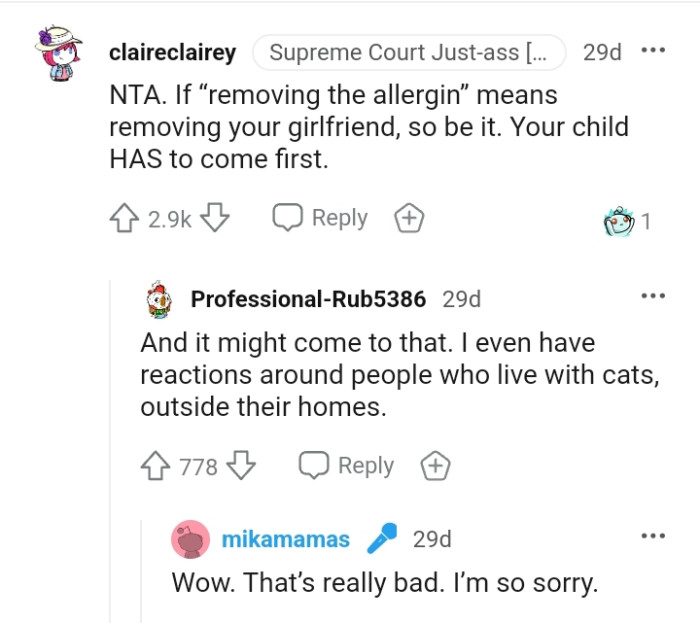
When faced with emotionally charged decisions, such as rehoming pets, individuals often experience cognitive dissonance. This psychological phenomenon occurs when one's beliefs conflict with their actions, causing discomfort and stress.
Research indicates that cognitive dissonance can lead to rationalization, where individuals justify their decisions to alleviate discomfort. According to studies, this effect can significantly impair judgment, making it crucial for individuals to engage in open dialogue about conflicting values and emotional attachments.
Balancing Priorities
Psychological research underscores the importance of balancing personal values with practical realities. In relationships, this balance can often lead to tension when facing conflicting priorities.
Couples may benefit from discussing their values openly, allowing each partner to express their attachment to the pets while acknowledging the child's health needs. This open dialogue can lead to compromises, such as seeking allergy treatments or considering hypoallergenic alternatives.
The Emotional Attachment to Pets
Pets often become integral members of the family, creating strong emotional attachments.
Dr. Laura Bennett, a clinical psychologist at the University of Toronto, highlights that the bond between humans and their pets can significantly impact emotional well-being.
Her research shows that losing a pet or being forced to rehome one can lead to feelings of grief and anxiety.
You need to protect your daughter's health

Let her be upset as she moves out

Either the cats get a new home or your girlfriend leaves

Attachment Theory Insights
Attachment theory, developed by John Bowlby, underscores the importance of emotional bonds in relationships. A partner's request to rehome pets can trigger feelings of abandonment in someone who has formed a deep attachment to their animals.
Research shows that secure attachments promote resilience and emotional stability. In this scenario, discussing feelings about the cats openly can foster understanding and reinforce the bond between partners, ensuring both parties feel heard and valued.
Studies indicate that children often develop deep emotional connections with their pets, which can complicate decisions about rehoming.
Understanding these emotional ties is crucial for navigating conversations about pet care and responsibilities.
When parents advocate for rehoming pets, it can evoke strong emotional responses from children.
This Redditor would leave willingly rather than rehome the cats

You need to prioritize your daughter, so you're not wrong
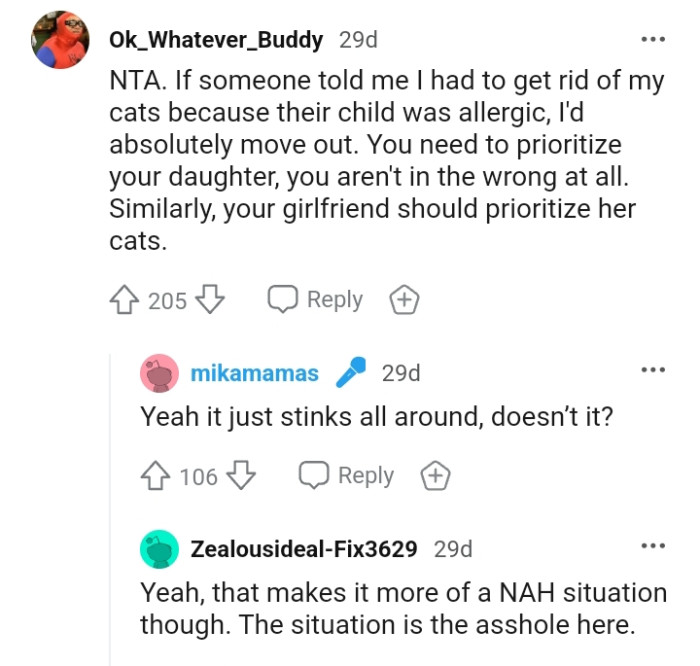
You prioritize your daughter while the girlfriend prioritizes her cats
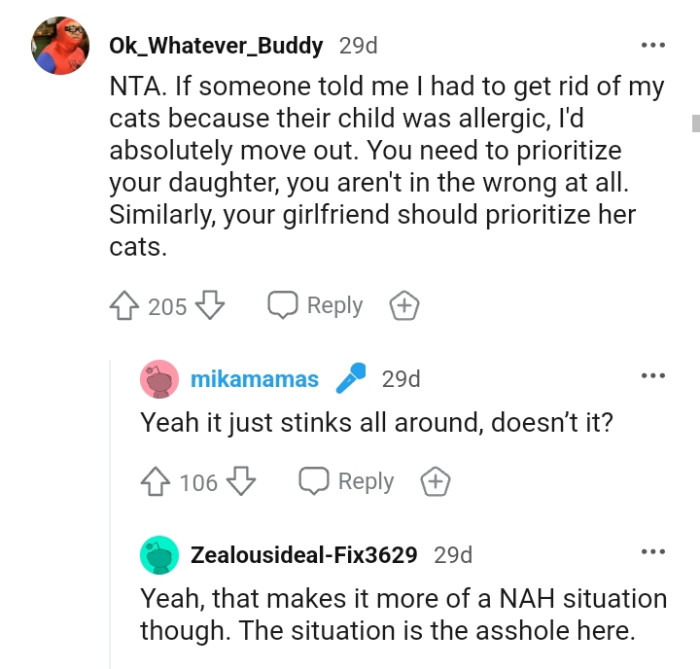
Behavioral psychologists suggest that a pet's presence in a home can significantly impact emotional well-being. Pets often provide companionship and unconditional love, which can be particularly important during stressful family transitions.
Studies have shown that individuals with pets report lower levels of anxiety and higher levels of happiness. Therefore, exploring alternative arrangements, such as allergy-friendly living spaces or regular cleaning routines, may help alleviate stress without sacrificing emotional support from pets.
The Psychological Implications of Pet Allergies
Pet allergies can create challenging dynamics in families, particularly when emotional attachments are strong.
Research from the Journal of Allergy and Clinical Immunology indicates that allergies can lead to difficult decisions about pet ownership.
Understanding the implications of allergies on family dynamics is essential for making informed decisions.
Unfortunately, you and she are just not compatible
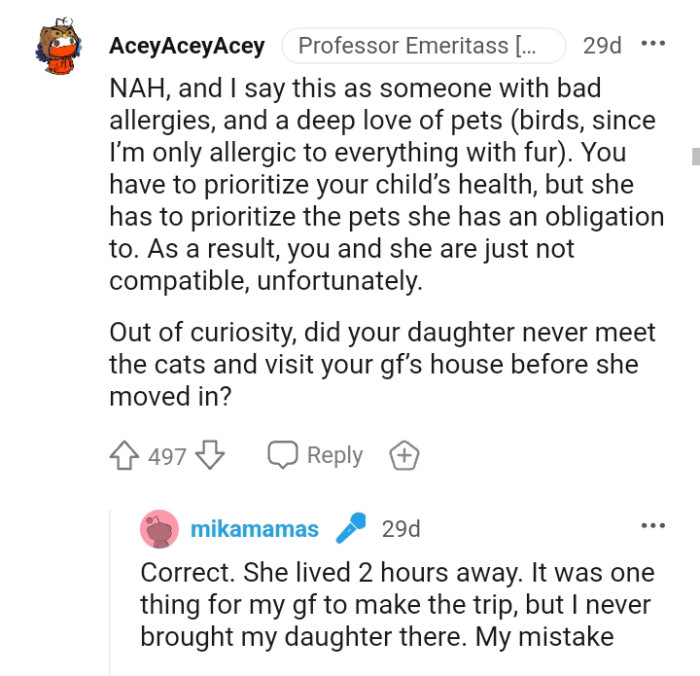
The OP's daughter has never met the cats prior to his GF moving in
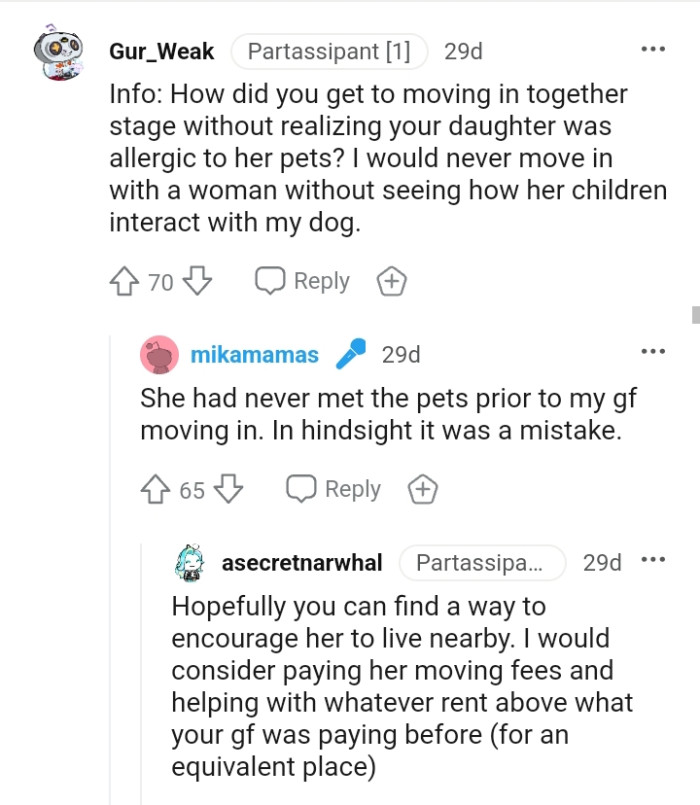
You should help her move out because she needs to

Conflict Resolution Strategies
Researchers emphasize the importance of effective communication in resolving conflicts. The 'interest-based relational' approach advocates focusing on mutual interests rather than positions during discussions.
This method encourages couples to explore underlying emotions and needs, creating solutions that address both the child's allergies and the partner's attachment to their cats. Practical strategies like collaborative problem-solving and empathy can help foster understanding and lead to a more amicable resolution.
Practical approaches for managing allergies include consulting with medical professionals for potential solutions.
Families can explore options like allergy treatments or hypoallergenic breeds to alleviate concerns while maintaining pet ownership.
Additionally, creating pet-free zones within the home can help balance the needs of all family members.
The OP needs to help the GF move

She deserves to be able to breathe in her own home
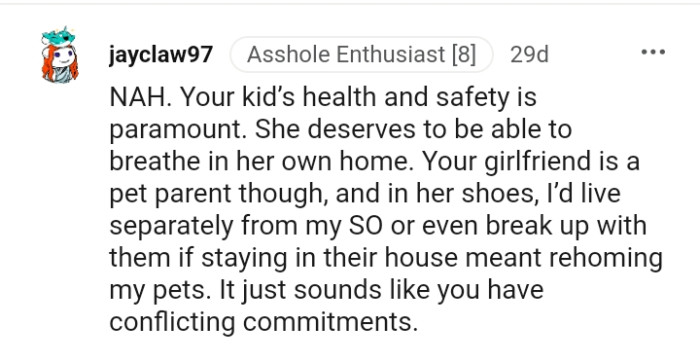
Your daughter's health has to come first
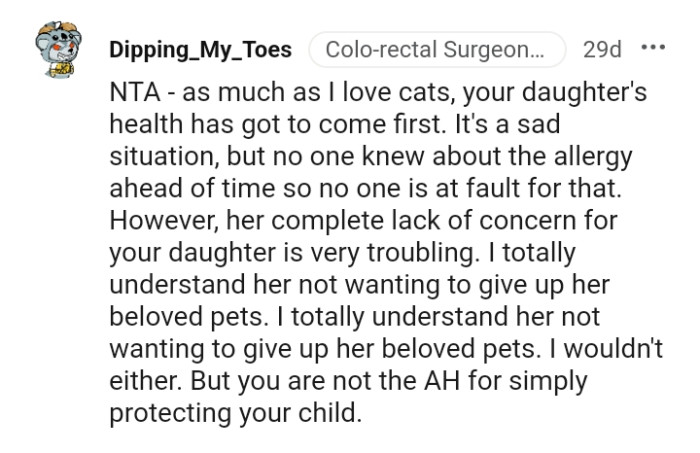
Research in developmental psychology highlights the role of pets in childhood development. Pets can teach children empathy, responsibility, and nurturing behavior.
However, when a child has allergies, this dynamic may shift, causing emotional distress. Addressing these feelings through family discussions can help children articulate their experiences while considering alternative pet arrangements, ensuring their emotional needs are met alongside health concerns.
Navigating Family Conversations About Pets
Open communication is vital when discussing sensitive topics like rehoming pets.
Research shows that clear, empathetic conversations can help family members navigate their feelings and expectations.
By addressing these concerns openly, families can work toward solutions that honor both the emotional attachments and practical needs.
You can look for foster options in the meantime

It all depends on how much you're willing to help your girlfriend move

She can ask a family member to take the cats briefly

The Role of Emotional Regulation
Emotional regulation is a key component in managing relationship conflicts. Psychologists have found that the ability to manage emotions can enhance interpersonal relationships and decision-making skills.
In this case, both partners need to practice emotional regulation to navigate the stress of potential pet rehoming. Techniques such as mindfulness and deep-breathing exercises can help individuals manage anxiety, allowing for clearer communication and more constructive discussions about the situation.
An allergy to cats doesn't just go away
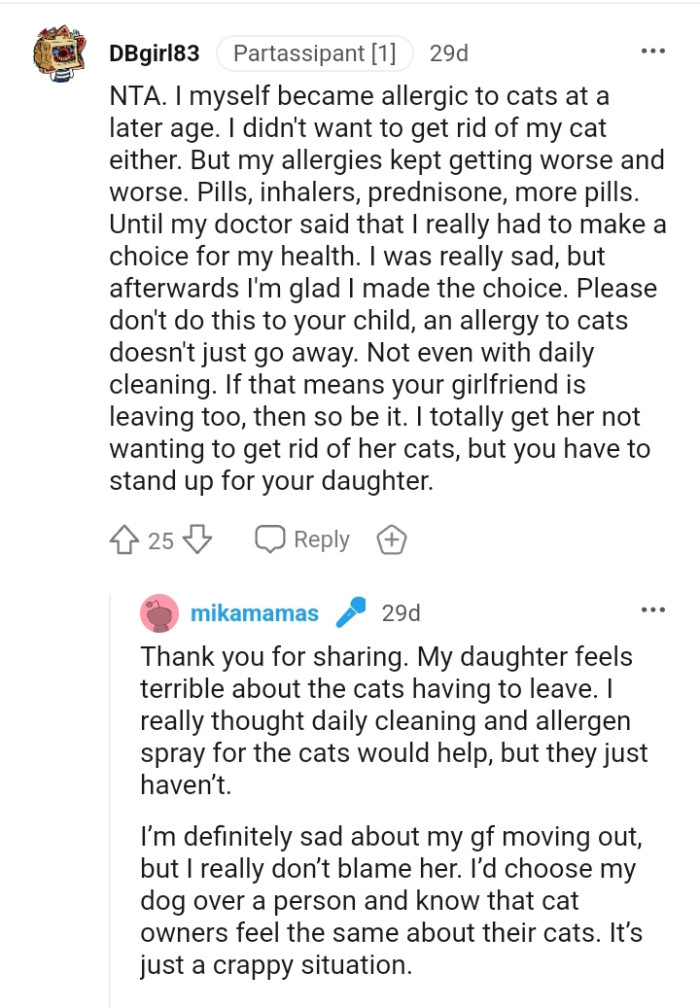
Nobody knew, and nobody was trying to hurt anybody

This is a serious problem that poses a risk to her welfare
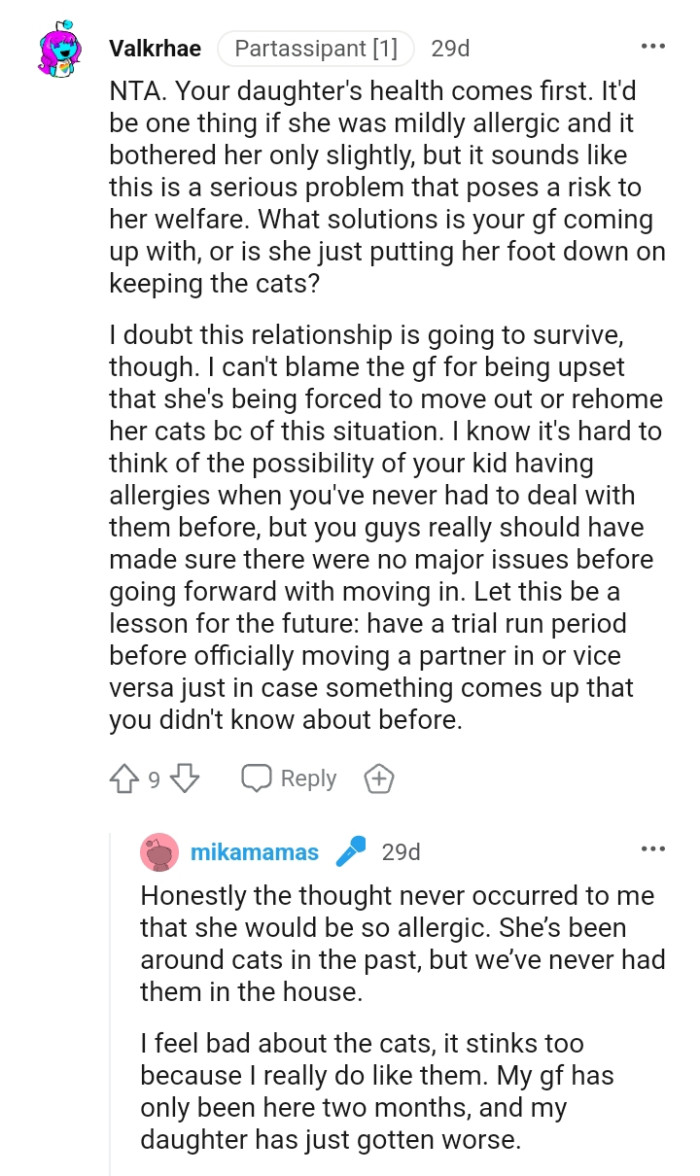
Social psychologists point to the significance of social support in stressful situations. Individuals who have strong support networks are better equipped to handle challenges, including family conflicts related to pets.
Maintaining open lines of communication with friends and family about the situation can provide emotional relief. Engaging in support groups for pet owners facing similar dilemmas can also offer valuable insights and coping strategies.
Cat hair and dander get everywhere

Washing the cats (follow the rules on the bottle about letting them soak for 5 minutes) with some chlorhexidine cat wash to reduce dander, getting each room (kitchen, living room, daughter's room, bathroom) an air purifier, and putting his daughter on a nightly Benadryl regimen are only a few tips given by Redditors to the OP. This is a short-term 'solution' to give his girlfriend time to rehome herself or the cats.
Psychological Analysis
This scenario illustrates the profound emotional connections families develop with their pets.
When faced with challenges like allergies, it's essential to balance emotional attachments with practical needs. Open dialogue and empathy can help families navigate these difficult conversations effectively.
Analysis generated by AI
Analysis & Alternative Approaches
In summary, the emotional and psychological implications of pet ownership are complex and multifaceted.
Understanding the emotional connections involved can guide families in making sensitive decisions about pet care.
By fostering open communication and exploring practical solutions, families can navigate the challenges of pet ownership while honoring their emotional bonds.
Overall, navigating the complexities of relationships requires an understanding of psychological principles and effective communication. By engaging in open discussions and utilizing emotional regulation strategies, partners can work through challenges together.
According to Dr. John Gray, a relationship author and expert, “Communication is not just about talking; it’s about understanding and being understood.” Additionally, Dr. Pepper Schwartz, a sociologist and relationship expert, emphasizes that “Building a foundation of mutual respect and empathy is crucial for resolving conflicts and creating lasting connections.” Ultimately, finding solutions that honor both personal attachments and practical necessities is key to fostering harmony and understanding.



